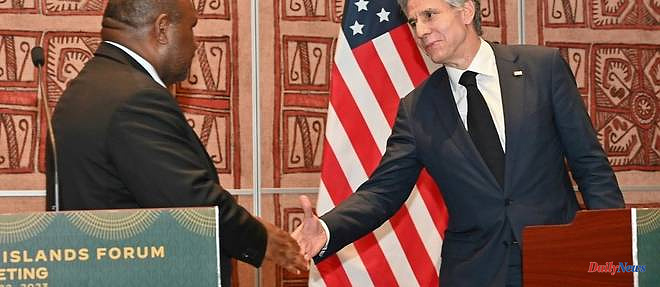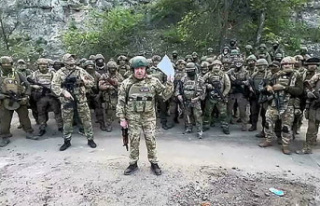Papua New Guinea on Monday signed a security pact with Washington giving US forces access to ports and airports in the Pacific country, where the United States seeks to counter China's influence.
"We are moving from a generic relationship... to a specific relationship with the United States. A defense cooperation agreement has been reached," Papua New Guinea Prime Minister James Marape announced alongside of US Secretary of State Antony Blinken, ahead of a Pacific Islands summit.
The agreement was signed ahead of the opening of the US-Pacific Islands Forum meeting of leaders from 14 South Pacific island states in Port Moresby.
Speaking of a "completely transparent" agreement, Mr Blinken said the two countries could board each other's ships, share expertise and "patrol better" together at sea.
It has "nothing to do with another country. It's about our relationship with the Pacific islands and the vision we share for this region", he added, while without being named, China is at the heart of American strategic concerns.
Washington also pulled off another diplomatic coup by signing the renewal of its strategic pact with the island of Palau on Monday.
A sign of growing rivalries in the South Pacific, Mr. Blinken was not the only representative of a great power in Port Moresby, placed under tight security.
He was preceded a few hours earlier by Indian Prime Minister Narendra Modi, the first Indian head of government, to visit Papua New Guinea.
"We support a free, open and inclusive Indo-Pacific region. We respect the sovereignty and integrity of all countries," Modi told regional leaders.
The American agreement signed with Papua New Guinea extends the capacity of the United States to deploy militarily in the region. It gives them a foothold along the sea routes to Australia and Japan.
China signed a secret pact with the neighboring Solomon Islands in 2022 that allows Beijing to deploy troops there.
The United States fears that with a Chinese military foothold in the South Pacific, China will overwhelm its naval base in Guam, and complicate the defense of Taiwan in the event of a Chinese invasion.
"Port Moresby is no longer the sleepy diplomatic outpost it once was," said Gordon Peake at the Asia Center of the United States Institute for Peace (Usip). "Even if China is not mentioned anywhere in the document, it is implicit in this deepening of relations between the United States and Papua New Guinea," he said.
Mr. Marape, however, clarified that this agreement would not prevent him from entering into similar alliances with other countries, including China.
He also indicated last Thursday that Papua New Guinea could in exchange better combat illegal activities on the high seas thanks to access to American surveillance satellites.
Chinese Foreign Ministry spokeswoman Mao Ning reacted to the agreement on Monday, saying that Beijing does not oppose "normal exchanges" between nations, warning to be wary of the use of the cooperation "as a pretext for geopolitical games" in the Pacific.
The US-Papua deal has sparked student protests at several universities, according to the Post Courier, Papua New Guinea's largest newspaper.
The deal fuels fears that the country is giving US forces too much freedom at some key access points in the country.
In Port Moresby, dozens of students gathered at the University of Papua New Guinea in the evening, some setting tires on fire. Vehicles were stoned, according to a private university security guard.
In addition to the agreement, the United States promised Papua $45 million in funding to fight organized crime, climate change, the AIDS virus and protective gear for its military, according to the Department of Defense. American State.
Joe Biden, whose uncle died in Papua New Guinea during World War II, was originally set to become the first US president to visit the South Pacific country on Monday.
He had to cancel his trip due to negotiations on the US public debt and was replaced by Mr. Blinken.
22/05/2023 16:08:21 - Port Moresby (AFP) - © 2023 AFP












